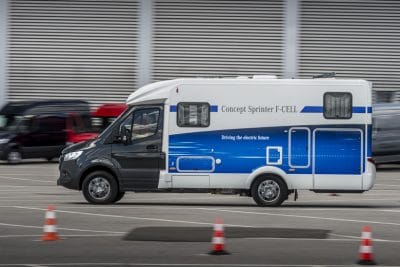At first, Daimler announced that it wanted to use fuel cells in light commercial vehicles. However, a few days later, news broke that the automaker planned to offer buses equipped with the technology as well, provided tests in a reasonable amount of time between 2020 and 2022 are successful. The decision is exemplary of the latest trend in the hydrogen and fuel cell industry to refocus efforts on commercial transportation.
Daimler showed its new vehicle base, a Sprinter powered by an electric motor and a fuel cell, on July 2. The fuel cell installed in this electric van is intended to function as a range extender during long-distance drives, opening up new opportunities for commercial and recreational uses. Three tanks were integrated into the underbody of the vehicle called Concept Sprinter F-Cell. Reportedly, they can store 4.5 kilograms of hydrogen to offer a range of 186 miles (300 kilometers), with a battery adding another 19 miles (30 kilometers) to the total. Like the GLC F-Cell, the 147-kilowatt van has a rear-wheel drive and was designed as a plug-in hybrid.
Daimler said that the benefits of the concept vehicle were a high range, a low overall weight, fast refueling and great versatility. Nevertheless, it seems the company is not gearing up for mass production: The relevant press release read that Mercedes-Benz Vans was putting a strong focus on custom solutions.
Volker Mornhinweg, who manages the Mercedes-Benz Vans division, stated that “an electric motor option will be part of all our commercial vehicle offerings at some point down the road. We will begin by selling the eVito this year and the eSprinter in 2019.” He said that fuel cells had been incorporated into Daimler’s eDrive@VANs strategy for their great medium-term advantages, particularly long distance, regardless of whether people took trips for business or pleasure. “There is no doubt that the technology has considerable potential and even more so when it is installed in relatively large vans used for long drives, where fast refueling is a must. After assessing the situation, we believe fuel cells can be a sensible addition to a product lineup such as ours, which consists of solutions for both private and business purposes.”
Fuel cell bus with a range of nearly 250 miles
Daimler likewise revealed plans to re-enter the market for fuel cell buses. In late July, the mayor of the German city of Stuttgart, Fritz Kuhn, signed a letter of intent to have transit company SSB test four articulated buses by the automaker between 2020 and 2022. These buses, called eCitaro, would be either all-electric or hybrid ones, with fuel cells increasing the range of the latter. Till Oberwörder, who heads Daimler Buses, said that the letter “by a large transit company proves we recently made the right choice in offering eCitaro buses with a variety of battery technologies, as well as fuel cell range extenders.”
Daimler unveiled its all-electric eCitaro bus on July 10, during a preview event for the IAA Commercial Vehicles. It has up to 243 kilowatt-hours of battery capacity, which is thought to be enough for around a third of all city runs in Germany. In 2020, a larger battery will reportedly raise that share to half of all scheduled routes. A fuel cell added at a later time would make for a range of 249 miles (400 kilometers).


























0 Comments